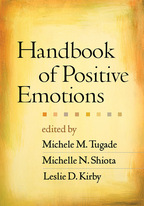Handbook of Positive Emotions
Edited by Michele M. Tugade, Michelle N. Shiota, and Leslie D. Kirby
Foreword by Barbara L. Fredrickson
HardcoverPaperbacke-bookprint + e-book
Hardcover
orderFebruary 3, 2014
ISBN 9781462513970
Price: $95.00 527 Pages
Size: 7" x 10"
Paperback
orderFebruary 12, 2016
ISBN 9781462526710
Price: $63.00 527 Pages
Size: 7" x 10"
“This handbook provides a rich and valuable summary of the current knowledge about positive emotions, the diverse theoretical orientations used to understand them, and the neurobiological, physiological, and psychological methodologies employed to study them….Recommended. Upper-division undergraduates through faculty and professionals.”

—Choice Reviews
“Just what the doctor ordered! The Handbook of Positive Emotions showcases exciting developments in the study of positive emotions and highlights key themes of interest to affective scientists, instructors, and clinicians alike.”

—James J. Gross, PhD, Department of Psychology, Stanford University
“Handbook of Positive Emotions draws together a richly diverse set of scholarly perspectives on the contemporary science of pleasant affective states. Readers will encounter herein leading-edge theory and research that promises to challenge them to appreciate positive emotions with greater nuance and greater attunement to context and supporting values….After reading through the chapters, readers will come away with the feeling that they have examined a particular theoretical debate from nearly every possible angle. Each contributor offers the gift of making complex concepts accessible.”

—from the Foreword by Barbara L. Fredrickson, PhD, Department of Psychology, University of North Carolina at Chapel Hill
“It has taken a long time for psychologists to understand the importance of positive emotions and to address them systematically. This state-of-the-art volume offers a well-chosen selection of theories, research, and applications. It includes discussions of specific emotions and addresses social processes and interindividual differences. Demonstrating how mature the study of positive emotions has become, this book should play an important role in consolidating future research efforts in the field. It is relevant for all students of emotion science, from undergraduates to seasoned researchers.”

—Arvid Kappas, PhD, School of Humanities and Social Sciences, Jacobs University Bremen, Germany
—Choice Reviews
“Just what the doctor ordered! The Handbook of Positive Emotions showcases exciting developments in the study of positive emotions and highlights key themes of interest to affective scientists, instructors, and clinicians alike.”
—James J. Gross, PhD, Department of Psychology, Stanford University
“Handbook of Positive Emotions draws together a richly diverse set of scholarly perspectives on the contemporary science of pleasant affective states. Readers will encounter herein leading-edge theory and research that promises to challenge them to appreciate positive emotions with greater nuance and greater attunement to context and supporting values….After reading through the chapters, readers will come away with the feeling that they have examined a particular theoretical debate from nearly every possible angle. Each contributor offers the gift of making complex concepts accessible.”
—from the Foreword by Barbara L. Fredrickson, PhD, Department of Psychology, University of North Carolina at Chapel Hill
“It has taken a long time for psychologists to understand the importance of positive emotions and to address them systematically. This state-of-the-art volume offers a well-chosen selection of theories, research, and applications. It includes discussions of specific emotions and addresses social processes and interindividual differences. Demonstrating how mature the study of positive emotions has become, this book should play an important role in consolidating future research efforts in the field. It is relevant for all students of emotion science, from undergraduates to seasoned researchers.”
—Arvid Kappas, PhD, School of Humanities and Social Sciences, Jacobs University Bremen, Germany



